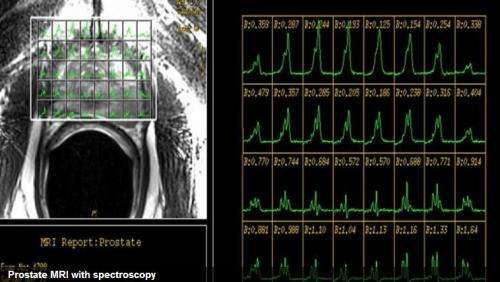It took Wayne Wentzel 14 years, multiple tissue biopsies and travel to four hospitals across multiple states to identify the underlying source of his rising prostate specific antigen (PSA) level. He finally found answers at the University of Cincinnati Cancer Institute.
PSA is calculated based by blood test and used to identify potential signs of prostate cancer. Other issues can contribute to rising PSA—such as enlarged prostate and infection—but the test is the medical community's No. 1 tool for prostate cancer screening.
On a mission to find answers, Wentzel's son-in-law—a Georgia radiologist—found Cincinnati-based radiologist Sadhna Verma, MD. She leads an innovative prostate imaging program based at UC Health University Hospital that utilizes both magnetic resonance and 3T spectroscopy imaging to more accurately diagnose prostate cancer before invasive measures are taken.
"MR imaging has shown to improve detection and accuracy of staging of prostate cancer in patients with prostate cancer," says Verma, a UC associate professor of radiology and UC Health radiologist. "Adding functional sequences gives us biochemical clues in addition to anatomic data to help us pinpoint cancers in the prostate gland that often go undetected otherwise."
Wentzel, a 69-year-old retired pastor from Michigan, began experiencing a rising PSA in 1998. Before arriving in Cincinnati, he had undergone eight prostate biopsies that resulted in the removal of 52 tissue samples —all were negative for cancer.
"The biopsies were painful and got me nowhere. The 3T multi-parametric prostate MRI with MR spectroscopy scans at UC came back to show a mass in my prostate immediately. Following this, I had an MRI-guided biopsy that confirmed Gleason grade 7 prostate cancer," recalls Wentzel.
He traveled back home to Ann Arbor, Mich., to undergo robotic prostate cancer surgery closer to home in August 2012.
"I can finally focus on enjoying my retirement without worrying about that rising PSA. I exercise daily to keep my energy up and take the boat out any opportunity I get," he says.
About the Prostate Imaging Program
In partnership with UC Health, the UC Cancer Institute offers comprehensive evaluation of the prostate gland that provided both anatomic and biochemical information about the gland.
"Prostate cancer treatment is determined primarily by the stage of disease and whether cancer is confined within the prostate capsule or has extended beyond the prostate gland," explains Verma, who is part of the multidisciplinary genitourinary cancer team at the UC Cancer Institute. "Men have several choices when it comes to prostate cancer treatment. Accuracy of staging is critical for choosing the approach that is right for each individual."
More information: Prostate imaging services: www.med.uc.edu/radiology/resea … rentstudies/Prostate%20Program/Index.html
Provided by University of Cincinnati



















